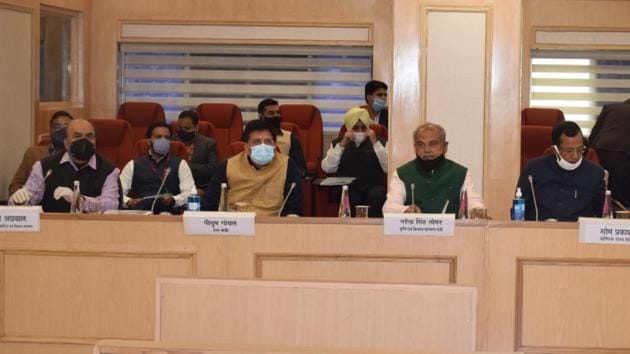Dilli Chalo protest: Centre, farmers begin fresh talks; MSP assurance on the table
Ministers Narendra Tomar, Piyush Goyal and Som Prakash are leading the government side, while representatives of some of the biggest farmers unions in the country are speaking for the farmers
Three Union ministers are currently meeting leaders from 40 farm organisations for the fourth round of make-or-mar talks at the Capital’s Vigyan Bhawan, as protests by thousands of farmers against a set of farm laws continued for the seventh straight day.

Agriculture minister Narendra Tomar, railways, food and consumer affairs minister Piyush Goyal and minister of state for commerce Som Prakash are leading the government side, while representatives of some of the biggest farmers unions in the country, mainly from Punjab, are speaking for the farmers.
While the farmers want the three farm laws approved by Parliament in September to be revoked, the government has leaned on its new reform agenda for better crop prices and higher investments in the farm sector.
Opposition to the reforms has set off some of the biggest farmers’ protests in decades, posing a political challenge for the Narendra Modi government.
“It is possible that the government may offer some sort of undertaking or assurance that the reforms will not impact minimum support prices (MSP), although the reforms are not meant to have any impact on MSP,” an official said, requesting anonymity.
Farmers also want rollback of an ordinance invoked in October by the government to crack down on pollution in New Delhi, of which crop-residue burning is a major cause. The ordinance has riled farmers because it provides for steep penalties for polluters, including farmers who burn crop stubble, with a jail term of 1 year and fines of up to Rs1 crore.
“Higher subsidies that will enable farmers to adopt environment-friendly technologies as an alternative to crop-residue burning is another option before the government,” a second official said.
The recent reforms in the antiquated farm sector allow businesses to freely trade farm produce outside the so-called government-controlled mandi system, permit private traders to stockpile large quantities of essential commodities for future sales and lay down new rules for contract farming.
In the last round of talks on December 1, which was inconclusive, the government had asked the farm unions to identify specific provisions in the three farm laws which they were opposed to. The three ministers had assured of appropriate responses to their objections in today’s meeting.
“The issue is not about one particular clause, but about the direction in which the Centre is pushing farming in India,” stated Avik Saha, the secretary of the All India Kisan Sangharsh Coordination Committee, in a letter to the farm minister ahead of Thursday talks.
Farmers fear the reforms could pave the way for the government to stop buying staples at federally fixed MSP, erode their bargaining power and leave them at the mercy of private buyers.
The government has insisted it will still buy staples at MSP, but farmers have demanded a law to guarantee that no sale of farm produce below MSP will be permitted.
Indian farmers receive lower-than-international prices for their produce because of increasing costs of cultivation, inadequate markets and the government’s obsession with keeping food prices low. This has worsened agriculture’s terms of trade, measured as a ratio of prices of agri-products to prices of manufactured items. The crisis, therefore, is not one of low production, but of low prices.
Economists say an MSP mechanism that ignores dynamics, such as demand and global prices, creates market distortions. If it is not profitable for traders to buy at federally-fixed MSP, when demand is low, then the private sector will simply exit the markets. In such a scenario, the government simply cannot be a monopoly buyer of all produce, said Pravesh Sharma, a fellow at New Delhi’s Indian Council for Research on International Economic Relations.
The assumption behind the new reforms is that free competition in agricultural markets will result in a market-clearing price, at which quantity supplied equals quantity demanded, resulting in an equilibrium.






